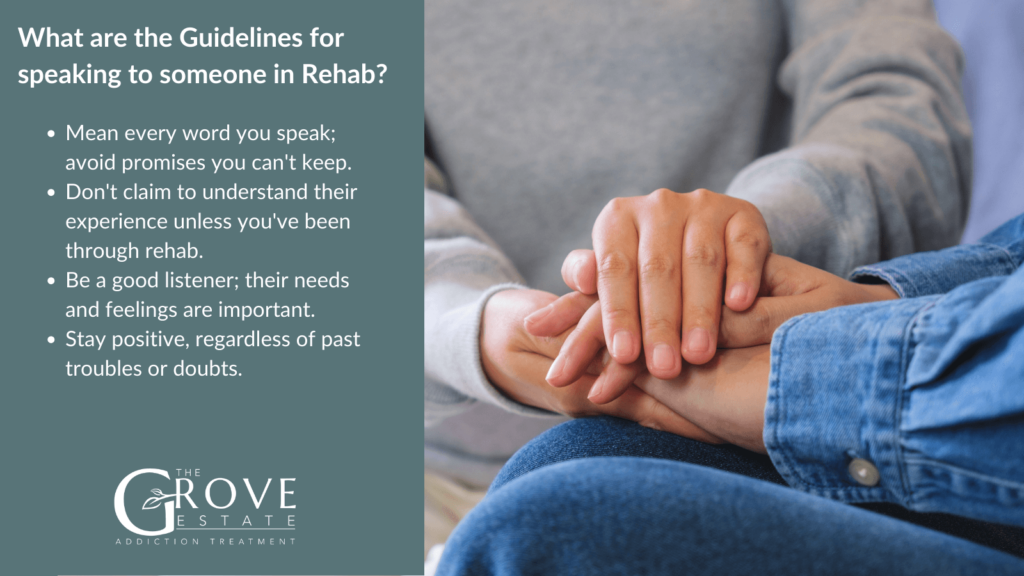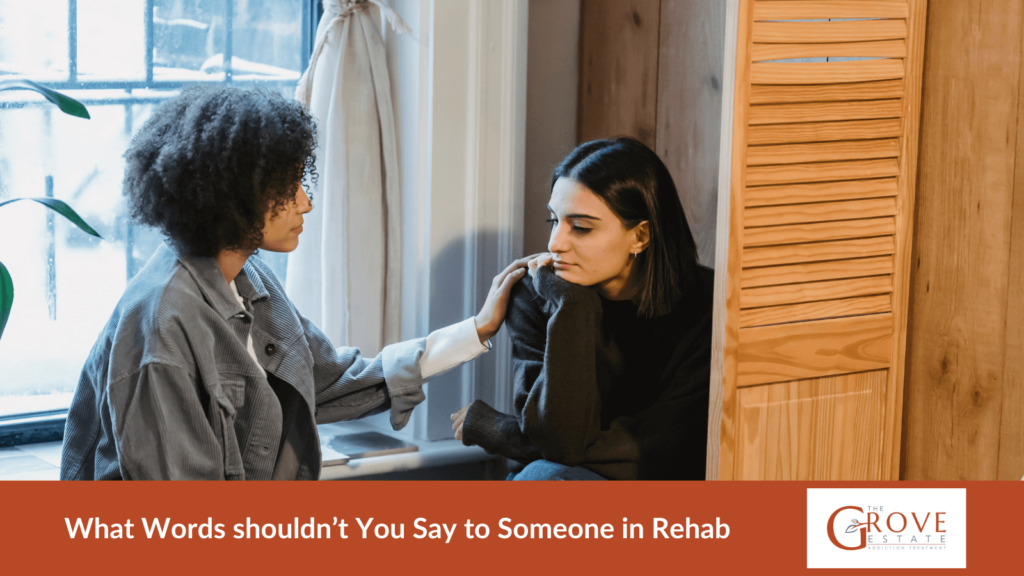An addiction recovery journey is often a very overwhelming journey for many people. Dealing with the withdrawal symptoms, such as anxiety, depression, vomiting, etc., that follow the discontinuation or reduction of substance use, is not easy. Professionals use detoxification as a part of treatment to reduce the symptoms, but it is still a lot to deal with for most people. According to the Substance Use and Mental Health Services Administration, about 42% of people who go to rehab for drug and alcohol addiction treatment compete it.
Therefore, individuals in rehab need all the support they can get, especially from their care providers and loved ones. Your words and your actions are important elements of your support for someone in rehab. Except if you have experienced it, it’s not easy to speak the right words. Asking, “How can I help you?” or saying, “I am proud of you” and “I am here for you” are some of the supportive words you can offer to someone in rehab.
Some things you shouldn’t say to an individual in rehab include: “I know what you are going through,” “What was your rock bottom?” and “You are going to be fine.”

What are the Guidelines for Speaking to Someone in Rehab?
Speaking to individuals in rehab is trickier than most people think. Many realize after saying the wrong things even when they meant the best. The following guidelines will help you use the right words most times:
- You must mean every word you speak: do not say anything you can’t back up with actions. So, be very certain before saying things like “I will be there whenever you need me”.
- Don’t assume you understand what they are going through except if you’ve gone through rehab yourself. Hence, statements containing clauses like “I understand” or “I know” should be avoided.
- Be a good listener: you don’t have to understand everything individuals in rehab are going through to provide support. The willingness to listen to them, including how they want you to help, is sometimes more important.
- Be positive: an individual in rehab may have caused you all sorts of trouble, including a relapse, hence legitimately filling you with doubts but you must never give up on them. Being positive in everything you say to them goes a long way because negativity, whether in words or actions, has a high risk of triggering them. They already feel very guilty and are very low on confidence. Your positivity will help their confidence.

What Words Should You Say to Someone in Rehab?
The following positive and reassuring statements are great examples of what you should say to an individual in rehab:
I am Proud of You
This is one of the most powerful statements you should say to anyone, especially when you hold a privileged place in their lives. We’ve all, at one time or the other, had this said to us or hoped it was said to us, didn’t we?
Telling someone in rehab you are proud of them shows you acknowledge their efforts and the steps they are taking. It shows you value them and helps them overcome the overwhelming feeling of guilt caused by their addictions. Milestones are excellent times to express your feeling of pride towards someone in rehab.
What Can I Do to Support You?
Individuals in rehab need people they can lean on throughout the journey, especially in periods when they are struggling. They may not ask for help because they don’t want to be a burden. Therefore, regularly asking what you can do to support them will mean so much to someone in rehab. It also allows them to communicate what they feel and need to you, hence you know exactly what to do for them. Sometimes, just hearing you ask what you can do to support them is enough encouragement for them because they know you care.
I Am Here For You
No matter how committed you are to someone in rehab, you will sometimes be unsure of what to say. In these circumstances, I am here for you is one of the most reassuring things you can say. It is a simple statement, but knowing someone’s got your back is deeply comforting.
You are Not Alone
It is similar to “I am here for you” but it works better in another context. One of the symptoms of addiction is that individuals ostracize themselves from family and friends, hence they get used to being alone. When in rehab, they start learning how to rebuild their relationships. Hence, telling someone in rehab they are not alone is usually so empowering.
I Believe You’ve Got This
Self-belief is not something individuals struggling with addiction have in abundance. Hence, hearing someone in their corner say they believe in them could change a lot of things for their recovery journey. It often energizes them to fight cravings and triggers.
Take Things One Day at a Time
Life is often a lot for most of us. So, we crack it by going just one day at a time. The same applies to people in rehab. Worrying about going the entire duration of addiction treatment will only make the journey tougher. Hence, it is about going just one day at a time, not worrying about anything else. This could also mean one goal at a time, depending on which one is simpler at a time. When someone in rehab seems to be struggling with the programs, one of the best things you can say to them is to go one day at a time.
Focus on Yourself and Recovery
It’s a human thing to worry about a lot of things. Individuals in rehab often worry about their job, finances, family, etc. This has the tendency of distracting them from focusing on themselves and their recovery journey. Hence, it is good to remind them they deserve to focus on themselves and their recovery.
What Have You Learned in Rehab So Far?
Asking what someone in rehab has learned so far shows you care about their recovery. Also, the answer you get makes it easier for you to engage them.
How is it Going?
This is a general question that allows you to get the thoughts and experiences of individuals in rehab. It gives them the chance to take control of the conversation, talking about all they want.
What are Your Future Goals?
One of the aims of rehab is to help individuals rediscover themselves, living for a purpose. Therefore, reminding someone in rehab of their life goals by asking what the goals are can be a very great motivation for them.
I Love You
We all need love, don’t we? Addiction makes people feel less deserving of good things, including your love. Telling someone in rehab you love them could help them overcome lingering guilt and find more energy to keep going in their recovery.
I Am Ready to Listen When You Need It
Sometimes, people in rehab are not ready to talk at a particular time. Therefore, saying you are ready to listen whenever they are ready could make them feel more comfortable talking to you about their experiences.

What Words Shouldn’t You Say to Someone in Rehab?
Some of the things you must never say to someone in rehab, regardless of circumstances, are as follows:
Don’t Say You Are Going to be Fine
It sounds positive but it is simply an empty statement, because you actually don’t know they are going to be fine, and they know it. Rather say things like we can work on it together.
Don’t Say I Know What You Are Going Through
Again, you don’t know what they are going through. Even if you have gone through rehab, your experiences may differ.
Don’t Ask If Rehab is What They Need
While you mean no harm, asking if rehab is what they need could be very offensive as it means you are questioning their judgment. It must have been tough for them to choose rehab, don’t question it.
Don’t Ask For Their Rock Bottom
This is very personal information that you shouldn’t ask, except if an individual in rehab tells you themselves.
Don’t Call Them Names Like Addict, Junkie, or Alcoholic
These names are not only harsh, they infer an individual is the problem rather than having a problem.
Note: avoid talking to them when they (or you) are under the influence of a substance in case of relapse. If they are under the influence of drugs or alcohol, wait till the effects wear off. The same goes for you, as you are likely to say things you shouldn’t when ‘high’.
Could Intervention Be Too Late for an Individual with a Substance Use Disorder?
It is always better to diagnose addiction, like any other disease, early and begin intervention immediately. It significantly impacts the effectiveness, duration, and cost of rehab. However, it is never too late to help an individual with a substance use disorder. The severity of the addiction means a longer period and higher cost of rehab. The longer an individual is in the hole of addiction, the deeper they go. Hence, more comprehensive and intensive treatment may also be required.
Note: addiction treatment is hardly the same for any two individuals because their needs and personalities are different. Be patient with your loved one and understand that the risk of a relapse is high. This doesn’t mean failure of treatment. Keep supporting them and stay informed, as much as possible, about their recovery.
Can an Individual with Addiction be Forced to Go to Rehab?
The preferable thing would be to talk to an individual with SUD and make them see the need for rehab. This makes it easier to get them to take responsibility and be committed to their recovery. However, this isn’t always possible, as noted by the National Institute on Drug Abuse. Therefore, involuntary commitment laws are put in place in some states for people battling with substance or alcohol use disorders. To get a friend or family member in involuntary rehab, the following criteria are the common requirements:
- Loss of control
- An individual has been rendered physically or mentally disabled by the addiction
- An individual can no longer take care of their basic needs or personal affairs
- An individual has become a danger to themselves and/or others
- An individual now lacks the capacity to make decisions
Note: a professional has to confirm all of the above, even when you petition the court.

Share This Post



